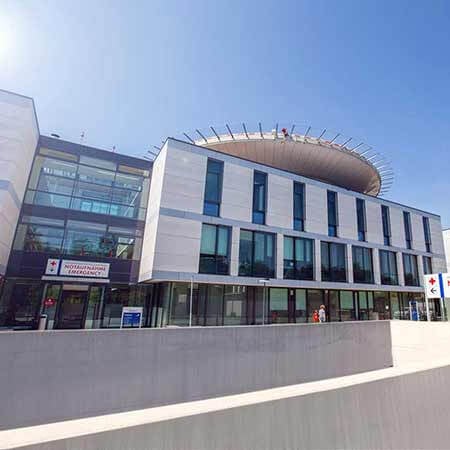T-cell lymphoma is usually an aggressive cancer that requires intensive chemotherapy. This type of cancer may develop both in children and adults. You can undergo your treatment for this disease in one of the hospitals abroad. You are welcome to use the Booking Health service to get information about the cost of treatment. Here you can make your treatment appointment abroad at a favorable price and on your preferred dates.
Content
- T-cell lymphoma treatment principles
- Treatment for different types of lymphoma
- Chemotherapy
- Immunotherapy and targeted therapy for T-cell lymphoma
- Radiation therapy for T-cell lymphoma
- Stem cell transplant for T-cell lymphoma
T-cell lymphoma treatment principles
Chemotherapy is the main treatment for T-cell lymphoma. Doctors use several drugs at the same time, and the course of therapy can last for several years: first in intensive, and then in maintenance mode. The drugs are administered not only intravenously, but also into the cerebrospinal fluid, since the tumor often spreads to the spinal cord.
The best results in the treatment of patients with T-cell lymphoma are achieved if the tumor has not yet spread to the bone marrow at the time of diagnosis. In this case, the likelihood of a cure with chemotherapy is high. If the disease has spread to the bone marrow, it becomes more challenging to cure T-cell lymphoma. The disease often recurs after treatment. Some patients have to resort to high-dose chemotherapy with a stem cell transplant to get rid of the pathology completely.
Treatment for different types of lymphoma
The treatment regimen for T-cell lymphoma depends on the type of disease diagnosed.
Adult T-cell leukemia/lymphoma is associated with the HTLV-1 virus. Some subtypes are non-aggressive and do not even need to be treated immediately after diagnosis. For example, follicular and small lymphocytic lymphomas are subject to monitoring only. Should treatment be required, it will primarily be immune (interferon) and antiviral. In the case of skin lesions, radiation therapy may become an option of choice. If the tumor spreads, a CHOP chemotherapy regimen is conducted. Some other options are more severe, so they immediately require chemotherapy and sometimes a stem cell transplant.
Angioimmunoblastic T-cell lymphoma grows rapidly and requires steroid treatment. These drugs provide a patient with a temporary effect. More stable results can be achieved with chemotherapy. Doctors abroad use monoclonal antibodies for this type of T-cell lymphoma. If the lymphoma is limited to a single anatomical area, cancer treatment can be provided with radiation therapy alone. In young patients with this type of lymphoma, a stem cell transplant is often used, since the disease can rarely be cured with chemotherapy. Chemotherapy drugs provide remission, but in a short time, the pathology recurs.
Extranodal NK/T-cell lymphoma, nasal type, develops in the nasal passages. At stage 1-2, the disease can be cured with radiation therapy. If it is not enough, irradiation will be carried out in combination with chemotherapy. Doctors may use different combinations of drugs depending on the outcome. Sometimes the tumor may disappear completely. A stem cell transplant is recommended for such patients so that the disease does not return in the future.
Enteropathy-associated T-cell lymphoma originates in the intestine. The main treatment option is CHOP chemotherapy. At an early stage of the disease, radiation therapy may be an alternative method. Sometimes the disease may be complicated by intestinal perforation, so some patients require surgery to partially remove it. Surgery becomes the first treatment option if a person has already had an intestinal perforation at the time of diagnosis or if cancer has caused intestinal obstruction. With a good response to chemotherapy, a stem cell transplant is recommended to try to cure the cancer completely.
Anaplastic large cell lymphoma originates in the lymph nodes and is characterized by an aggressive clinical course. This type of lymphoma can be treated with CHOP or CHOEP chemotherapy. Radiation therapy can also be used, and monoclonal antibodies often become an option of choice. Although this type of cancer is very aggressive, it is well treated. The tumors that contain many ALK proteins are characterized by a particularly favorable prognosis. Cancer can often be cured with chemotherapy. If a recurrence develops, another option for cancer treatment is a stem cell transplant. In cases where no other therapies work anymore, treatment abroad involves the use of antibody-drug conjugates. These are monoclonal antibodies with chemotherapy agents. Antibodies target cancer cells, so they deliver drugs directly to the tumor.
Peripheral T-cell lymphoma, unspecified, can be treated with CHOP chemotherapy. At an initial stage, the only possible treatment option is radiation therapy. Monoclonal antibodies and stem cell transplants are often used. If standard methods do not work, treatment abroad involves the use of the latest drugs for targeted therapy and immunotherapy.
Chemotherapy
For most types of T-cell lymphomas, chemotherapy is the primary treatment. The CHOP regimen is most commonly used, but there are also other regimens, such as CVP.
If these regimes do not work, doctors use others. There are dozens of drugs that are potentially effective in the treatment of various types of T-cell lymphomas. They can be used in certain combinations. Doctors prescribe drugs from different pharmacological groups, such as alkylating agents, glucocorticoids, platinum-based drugs, purine analogs, antimetabolites, anthracyclines, and others.
Chemotherapy is provided in cycles. Each course is followed by a rest period so that the body can recover. How many such cycles there will be depends not only on the type of lymphoma, but also on the results of treatment achieved. After achieving remission, doctors often continue chemotherapy for a long time, up to 2 years, to reduce the risk of a recurrence. However, such cancer chemotherapy is more sparing and it is carried out as a supportive measure.
Immunotherapy and targeted therapy for T-cell lymphoma
If you are undergoing your treatment abroad, most likely, doctors will prescribe immunotherapy or targeted therapy in addition to chemotherapy. The following drugs can be used to treat T-cell lymphoma:
CD52 monoclonal antibodies can be used for only some types of peripheral T-cell lymphomas. The course of treatment is 12 weeks and the drug is administered intravenously three times a week. Treatment is carried out against the background of antibiotic therapy and antiviral therapy, since the use of these antibodies leads to a decrease in the number of immune cells in the blood, which makes the body more vulnerable to infections.
CD30 monoclonal antibodies are used as part of an antibody-drug conjugate. They can even be used as the first-line therapy in combination with chemotherapy, and also as a stand-alone treatment for lymphoma that has recurred after primary therapy. The drug is injected into a vein 1 time in three weeks.
Histone deacetylase inhibitors are used in hospitals abroad as the second-line therapy, if at least one treatment regimen has been used, and it turned out to be ineffective. The course of treatment consists of 5 intravenous injections of the drug and it is repeated every 3 weeks.
Radiation therapy for T-cell lymphoma
In the early stages, radiation therapy helps to cure lymphoma even without chemotherapy. In the advanced stages, radiation therapy is used in combination with chemotherapy.
Doctors abroad conduct radiation therapy on the advanced linear accelerators. Doctors perform image-guided intensity-modulated radiation therapy. They obtain information about the location of the tumor before each radiotherapy session with the help of CT or MRI scans to direct the radiation precisely to the target and minimize radiation exposure to the healthy tissue.
Stem cell transplant for T-cell lymphoma
A stem cell transplant is the most effective treatment for T-cell lymphoma. It works well, even in the most severe and neglected cases. The specialists try to perform a transplant during the period of remission, which was achieved with the help of chemotherapy. It may also be performed in the case of a tumor recurrence.
Doctors use both autologous and allogeneic stem cell transplants to treat T-cell lymphoma.
Autologous transplant involves the use of the patient's own cells. This treatment option for the tumor is used more often because it is safer. However, autologous transplant is possible only if the tumor has not spread to the bone marrow and lymphoma cells are not detected in the blood. Otherwise, it will be difficult to obtain stem cells for transplantation that do not contain cancer cells. If tumor particles enter the graft, they become the cause of recurrence.
Allogeneic transplant involves the use of donor cells. This treatment option is more likely to cause complications, and it can be difficult to find a suitable donor, which increases the overall cost of treatment. Nonetheless, this transplant procedure is effective even if the lymphoma has spread to the bone marrow. Donor materials definitely do not contain any cancer cells. In addition, a "graft versus tumor" immune reaction is activated after the transplant, which helps doctors to destroy all tumor foci in the body due to immune attacks.
Before a stem cell transplant, doctors carry out high-dose chemotherapy, sometimes combined with radiation therapy. This is the main mechanism of the therapeutic effect. The use of such high doses of drugs is usually not possible, since its price is irreversible damage to the bone marrow, and the production of blood cells stops. However, as of today, this is not a problem because doctors restore the bone marrow after chemotherapy by injecting stem cells. Therefore, a few weeks after the procedure, the hematopoietic function will be restored, while the tumor can no longer recover, as it is completely destroyed, and the lymphoma is unlikely to recur even in the distant future.
If you want to undergo your treatment abroad, you are welcome to use the Booking Health service. Here you can find information about the best hospitals in the world, you can also get information about the cost of treatment and make an appointment at the hospital at a favorable price. The Booking Health employees will help you to select hospitals and arrange your trip.
When making your treatment appointment through our service, you will save on medical care abroad. Our website provides information about promotions and discounts on the cost of treatment offered by various hospitals, including those exclusively for Booking Health customers. Additionally, the cost of treatment is reduced due to the lack of additional fees for foreign patients.
Authors:
The article was edited by medical experts, board certified doctors Dr. Vadim Zhiliuk and Dr. Sergey Pashchenko. For the treatment of the conditions referred to in the article, you must consult a doctor; the information in the article is not intended for self-medication!
Sources:
National Cancer Institute
Cancer Support Community
Medscape










